by Erika Solberg

Writer Pico Iyer believes that travel is “a heightened state of awareness, in which we are mindful, receptive, undimmed by familiarity and ready to be transformed.” That description could fit the experience of VAMPY as a whole, but it works particularly well for those members of the community who are here from faraway places and who are studying new cultures.
One camper who has travelled far to reach Bowling Green is second-year camper Josie Calhoun, who has lived in the U.S. Virgin Islands for the last ten years. She brings with her a background different from many campers, such as her taste for chick pea and potato roti and her experience with living in an isolated environment: “Because we live on an island, we’re one big community, so I’m always working outside, helping. I have a lot of engineering knowledge, which came in handy last year when I took Problems You Have Never Solved Before.” Her home also influences her academic interests; Josie is taking Writing this year and will do her final project on sustainable living and climate change because “In the Virgin Islands, we have such beautiful coral reefs and a beautiful ecosystem. It’s important to preserve what we have left while we still can.”
Josie both teaches and learns from her fellow campers. She says, “Some campers thought I lived in a different country, and many of them didn’t know that because the Virgin Islands is a territory, I can’t vote in U.S. elections, and we don’t pay taxes.” On the other hand, “Last year, going to the Hot Rods game was the first time I ever went to a sporting event.”
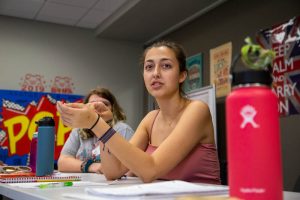
First-year camper Addie Blankinship, who previously attended three years of SCATS, brings a variety of geographical perspectives to VAMPY. Because of her father’s job working for a company that builds embassies and consulates, she has lived not only in Georgia, Louisiana, and Alabama, but also in Antigua and Barbuda in the West Indies, and, for the last year, in Guatemala, where she will stay until she graduates from high school.
Moving means being flexible and being open to new experiences. Addie says, “The last year has been a lot of learning Spanish. That’s a necessity because everyone speaks Spanish, and there’s minimal English. It’s also been a lot of making friends and traveling around the country to immerse myself in the culture. We’ve gone hiking on Mayan Ruins, we’ve gone to two different beaches, and we’ve gone to a lake that leads into a river that leads into the ocean by Belize.”
There is a lot in Guatemala she likes: “I live in this little area called Cayalá, and it kind of looks like Seaside in Florida. It’s all white buildings with Spanish tiles on the roof, and there’s a giant mall.” There is also great food: “One of my favorite restaurants is a place called Señora Pu’s. She is this tiny Guatemalan grandmother who cooks in one room that has a little bar on the outside. She makes delicious steak, garlic shrimp, and shrimp in a citrus sauce wrapped in a banana leaf.”
Addie has chosen to take Pop Culture this year, so she will be able to add a useful perspective to class discussions. “I feel like there’s so much that I can bring to the table,” she says. “There are many differences between here and Guatemala.”
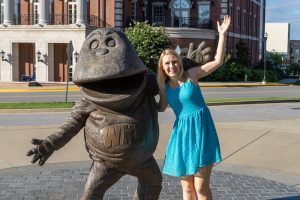
In contrast, Slovenian graduate student Nika Stradovnik will use what she observes at camp to contribute to the study of gifted students in her home country. Nika is working on her master’s in inclusive pedagogy, focusing on gifted studies. She met Dr. Tracy Inman, associate director of The Center, when Tracy was the keynote speaker at the 2017 International Conference of Talent Education in Slovenia, and asked if she could visit Bowling Green this summer to study our summer programming for gifted students, with Tracy serving as her mentor. Nika wanted to do research here because “unfortunately, in Slovenia, it is not a common practice to organize a camp for gifted children.”
The VAMPY students and teachers have impressed her. She says, “I had thought it would be too much, doing one class for three weeks, but now I can see that you can go really deeply into the subject, and the teachers are well-prepared. In the Humanities class, I could see how eager the students are. They interact so much with each other and completely focus in the discussions.”
Nika has also contributed to VAMPY herself. For example, in Nazi Germany and the Holocaust, “I shared with the students how I feel about the Nazi era because I’m from Europe, so I have a different perspective on the subject.”
Ultimately, Nika believes gifted students have a lot in common, no matter where they are from: “VAMPY students are really similar to gifted students in Slovenia. They are advanced teenagers with many, many interests. It’s really good to see an environment that can help develop their curiosity.”
Nika was also very impressed when she observed the Arabic class. In this course, the students are exploring a language and culture unfamiliar to them, under the guidance of Morrocan native and WKU Arabic instructor Lhouie Guerwane, who has taught the cousre for seven years.
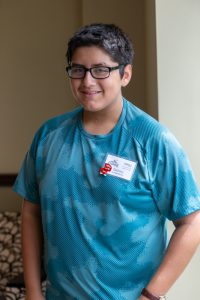
Lhouie always shows unending delight in sharing his knowledge with his students. On Wednesday, for example, when going over cardinal directions during a geography and vocabulary lesson, he extended his arms up, down, and to the sides to a catchy beat as the students said the words.
The first week of Arabic introduced students to the alphabet and the geography of Arabic countries. Later in the course, activities will include singing Arabic songs, making presentations on Arabic countries, and taking a field trip to visit a mosque and an Arabic market and restaurant in Nashville.
This year is the third time the class has been supported by a generous grant from Qatar Foundation International (QFI), a member of the Qatar Foundation which is funded by the Qatari government. QFI sponsors programs that promote Arabic education and culture in the United States, and it has found a willing and able group with the 2019 VAMPY students.
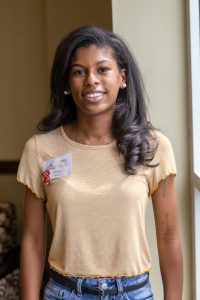
More than half of the 13 students this year already speak a language besides English, including Spanish, Chinese, French, Russian, American Sign Language, and Hindi. Zachary VanderMolen, who speaks Spanish, says that learning Arabic “enables me to speak in a totally different place in the world.” Other students also see the course as a way to expand their horizons: Bailey Chafin says “I really want to travel the world one day” and Olivia Moore says, “It’s cool to have a language that isn’t provided in my school. I may study Arabic in college and then travel or do study abroad.”
First-time TA Noah Stevens, who recently graduated from WKU with a major in Arabic, is excited about the course: “I’m looking forward to sharing with the students not only the language, which is an important tool that they’ll be able to use after class, but also sharing the culture so that they can get a feel for the Arab world right here in Kentucky.”
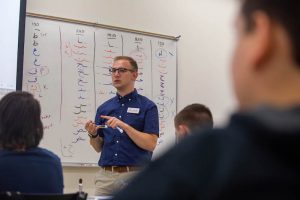
Whether Arabic students planning to travel the world, a graduate student looking to create the magic of VAMPY back in her own country, or campers exchanging perspectives with their classmates, the members of this year’s VAMPY community are open-minded and ready to share their experiences. As Pico Iyer writes, they are “ready to be transformed,” and also to transform those around them.
